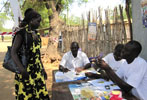
The latest brief from Human Rights Watch on violations of political rights in both North and South Sudan makes a very simple point: much (maybe too much) will have to be done between now and April before elections in Sudan can truly become the vehicle of profound democratic change for the Sudanese people.
The human rights organization cited numerous instances of political oppression and harassment by both major parties in Sudan—the ruling NCP in the North and its southern counterpart the SPLM—against dissenting voices. In addition to the ruling party’s December crackdowns of opposition demonstrations, HRW also documented harassment by Khartoum’s security forces of political activists around registration centers, restrictions of free speech and movement of election observers, and outspoken political dissenters:
“On December 6, national security forces assaulted two student activists for distributing fliers with anti-Bashir messages and to promote voter registration in a public park in Khartoum. The security officers beat them and detained them for several hours.”
The HRW brief emerged amid reports of arrests at a political rally in Sudan’s marginalized eastern region of Sudan. Last Friday, Sudanese police allegedly attacked opposition supporters, arresting 31, according to an opposition party candidate for governor.
In the South, opposition politics were similarly muffled. Most egregiously in November, the SPLM government attempted to outright ban the activities of a breakaway faction, the SPLM-DC. (The Sudanese Constitutional Court recently overturned the ban.) Other political parties also faced persecution:
“…[A]uthorities arrested Tong Lual Ayat, head of the United Democratic Party, on October 22, alleging that his party was not properly registered, detained him in a safe house for two weeks, and then transferred him to a military barracks. ‘I was placed under a tree and chained to the tree, even at night,” Ayat told Human Rights Watch.”
Perhaps even more troubling was HRW’s assessment that South Sudanese authorities and the U.N. mission in Sudan, or UNMIS, “have done little to prevent or prepare for likely security problems” despite the violent potential of elections-related disputes.
These field observations make clear that severe institutional changes would have to be made in these last months in order for elections to be free and fair. With less than three months to go, the international community must leverage its influence to send the message that there is a price to pay for undermining peace, and must be prepared to speak candidly about the results. Without the freedom to gather, to express dissenting opinions, or to vote for opposition parties, Sudan’s elections will undoubtedly be manipulated to maintain the political status quo and reseat a war criminal as president.
Photo: Woman registers to vote in South Sudan.

